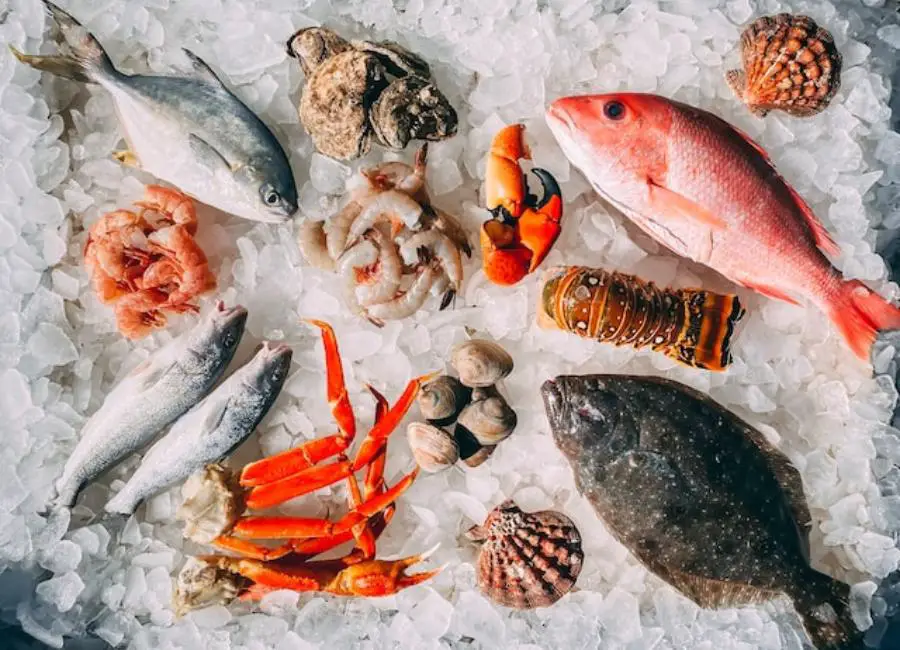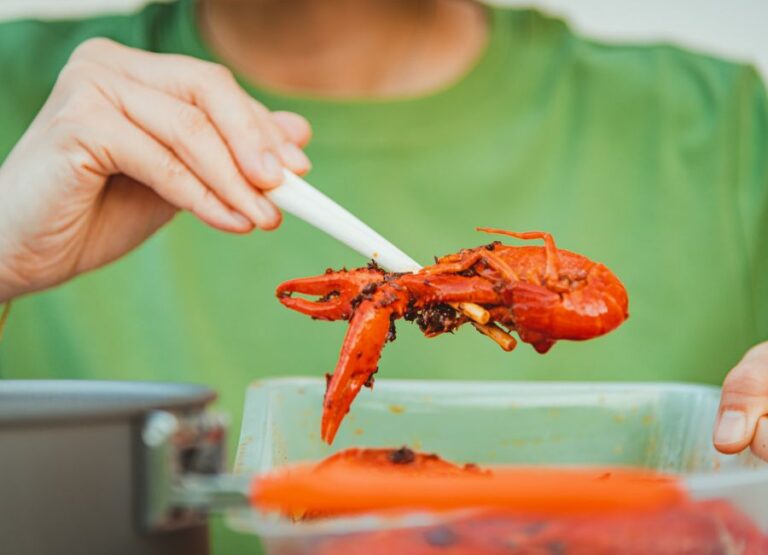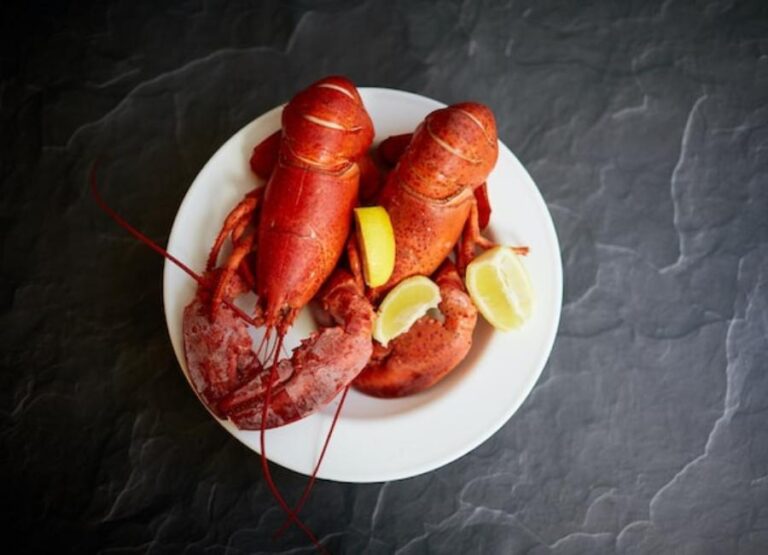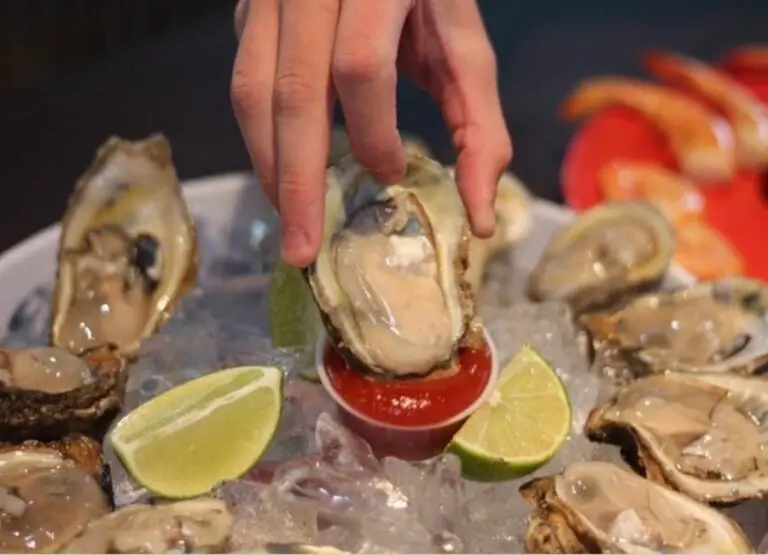10 Common Seafood To Avoid When Pregnant
In this blog post, we’ll discuss the seafood to avoid when pregnant, so you can make informed choices for yourself and your growing baby.
While seafood can be a great source of protein and omega-3 fatty acids, not all types are safe to consume during pregnancy.
Some can even be harmful to your baby’s development. Let’s discuss this…
Why Pregnant Women Should Avoid Certain Types of Seafood?
Pregnant women should avoid certain types of seafood due to the risk of mercury and other contaminants that can harm the developing baby’s brain.
The FDA recommends avoiding fish with high levels of mercury, such as bigeye tuna, king mackerel, marlin, swordfish, shark, and tilefish.
Additionally, pregnant women should avoid raw or undercooked fish, including sushi, oysters, ceviche, and smoked salmon, due to the risk of bacteria and parasites that can be harmful to the baby.
It is also recommended to avoid raw or undercooked meat due to the risk of contamination with bacteria such as salmonella and toxoplasmosis.
Learn more about the 11 seafood you can eat while pregnant.
Seafood To Avoid When Pregnant
During pregnancy, it is important to avoid certain types of seafood to prevent harmful bacteria or viruses and reduce mercury exposure.
Pregnant women should avoid raw or undercooked seafood, including sushi, sashimi, ceviche, and raw oysters, scallops, or clams.
They should also avoid large, predatory fish such as sharks, swordfish, king mackerel, or tilefish, which are high in mercury.
Lower-mercury fish such as canned light tuna, shrimp, salmon, catfish, and tilapia can be consumed in limited amounts, up to 12 ounces per week.
Here are some of the most common seafood to avoid when pregnant:
1. Sharks
Fish at the top of the food chain, such as sharks, build up significant amounts of mercury in their bodies.
Mercury is a poisonous metal that can damage a fetus’s developing nervous system.
The development of the baby’s brain may be hampered and the danger of mercury exposure increases if shark flesh is consumed during pregnancy.
2. Swordfish
Large predatory fish called swordfish can have high mercury concentrations, which is bad during pregnancy.
The growing fetus may suffer harm from mercury exposure during pregnancy, which could result in cognitive impairment, developmental delays, and other adverse outcomes.
Hence, to reduce their risk of mercury exposure, pregnant women should stay away from eating swordfish.
3. King Mackerel
Fish heavy in mercury such as king mackerel should be avoided during pregnancy.
High amounts of mercury exposure can have negative health effects like reduced cognitive and motor abilities, which are hazardous to the developing fetus.
4. Tilefish
The Gulf of Mexico is home to a kind of fish known as tilefish, which can have high mercury concentrations.
Mercury exposure from eating tilefish while pregnant has the potential to harm the developing brain and nervous system of the unborn child.
Due to the high levels of mercury in tilefish, the FDA advises against eating it while pregnant.
5. Orange roughy
The overfished fish species known as orange roughy may have high mercury concentrations.
Consuming overfished fish can exacerbate the issue of declining fish populations caused by overfishing.
Orange roughy should not be consumed during pregnancy to lower mercury exposure risk.
6. Raw Shellfish
Oysters, clams, and mussels that are raw may contain dangerous germs like Vibrio that can make you sick.
When pregnant, eating raw shellfish might raise the chance of contracting a foodborne disease, which can be harmful to both the mother and the growing fetus.
7. Marlin
Fish high in mercury, such as marlin, should be avoided during pregnancy.
Due to its position at the top of the food chain, marlin can have extremely high mercury concentrations.
Because of its possible mercury level and potential danger to the growing fetus, pregnant women should stay away from marlin.
8. Bigeye Tuna
Bigeye tuna is a variety of tuna that should be avoided while pregnant since it contains a lot of mercury.
Keep in mind that Bigeye tuna consumption may increase mercury exposure, which may be harmful to embryonic development.
9. Refrigerated Smoked Seafood
Salmon, trout, and whitefish that have been smoked and refrigerated may also carry Listeria, a dangerous infection that can get you sick.
To lower their chance of contracting a foodborne disease, pregnant women should stay away from refrigerated smoked seafood and choose completely cooked seafood instead.
10. Gulf of Mexico oysters
Due to the possibility of Vibrio vulnificus bacteria contamination, pregnant women should refrain from eating oysters from the Gulf of Mexico.
Serious sickness can be brought on by this kind of bacteria, especially in those with compromised immune systems.
Instead, expectant women should select contaminated-free oysters from different places.
Learn more about pregnant women and raw tuna.
Precautions for eating seafood while pregnant
Here are some precautions for eating seafood while pregnant:
- Mercury in seafood can be harmful to the fetus, so it is important to choose seafood that is low in mercury.
- Certain types of seafood, such as shark, swordfish, and king mackerel, should be avoided because they are known to have high levels of mercury.
- Canned, shelf-stable, and cooked smoked seafood are safe to eat, but raw or undercooked seafood should be avoided.
- Pregnant women should also be cautious of the risk of foodborne illness by making sure to properly store, prepare, and cook seafood.
- It is recommended to consume a variety of seafood to get a balance of various nutrients and avoid consuming excessive amounts of any one type of seafood.
Learn more about the signs of seafood poisoning.
Frequently Asked Questions
What types of seafood should I avoid during pregnancy?
Certain types of fish, such as shark, swordfish, king mackerel, and tilefish, contain high levels of mercury and should be avoided during pregnancy.
Can I eat canned tuna while pregnant?
Canned light tuna is generally considered safe for pregnant women to eat in moderation, but it is recommended to limit consumption of albacore or white tuna due to higher mercury levels.
Is it safe to eat raw seafood while pregnant?
Raw or undercooked seafood, such as sushi or sashimi, should be avoided during pregnancy as it may contain harmful bacteria or viruses that can cause foodborne illness.
Can I eat shellfish while pregnant?
Shellfish, such as shrimp, crab, and lobster, is safe to eat during pregnancy as long as it is cooked properly, and any potential allergies are taken into consideration.
Can I eat fish from local streams or lakes during pregnancy?
Fish caught from local streams or lakes may contain high levels of pollutants and should be avoided during pregnancy.
It is recommended to check with local advisories before consuming fish caught from these sources.
Can I eat fish and seafood from restaurants while pregnant?
It is generally safe to eat fish and seafood from reputable restaurants during pregnancy, as long as it is cooked properly and any potential allergens or contaminants are taken into consideration.
Learn more about pregnant women and AHI tuna.
Conclusion
In conclusion, while seafood can be a healthy and delicious addition to your diet, it’s important to be aware of the types of fish that are high in mercury and other harmful contaminants.
Pregnant women should avoid consuming shark, swordfish, king mackerel, and tilefish, and limit their intake of other types of fish to no more than 2–3 servings per week.
By following these guidelines and making informed choices, you can enjoy the benefits of seafood while keeping yourself and your baby safe and healthy.
So go ahead and indulge in that salmon or shrimp, but remember to always prioritize your health and well-being.
References


![Does Tuna Cause Constipation [Explained]](https://foodcreeks.com/wp-content/uploads/2023/02/Does-Tuna-Cause-Constipation-768x555.jpg)




